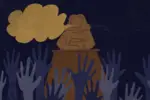What do you want to be when you grow up? This is a question that just about everyone has been beaten over the head with since they were small. At some point, a dinosaur stops being an appropriate answer. So, if you’re like me, you can go with the next best option: a writer.
Going into your freshman year of college is arguably one of the most daunting experiences you can go through with all its parties, new acquaintances, new subjects, plenty of assignments (i.e. term papers, research papers, synthesis essay outlines, etc.), et. al. And a lot of the time, entering a major that you are theoretically supposed to stick with for the next four years — and as a career into adulthood — can feel like you’re wandering into a maze blindfolded. Especially when the major you’re pursuing is only offered at some 400 out of nearly 5,300 colleges in the country.
Writers are a small community, and only a handful of schools even offer a major dedicated to creative writing. It’s not exactly like there is going to be a slew of self-help books to get you ready for your first year as a writing major.
Like any major, your expectations going in wind up being almost exactly the opposite of reality. Whether you’re about to start off your freshman year or are still on the fence about choosing a major in creative writing, here are some tips from someone who is halfway through their BFA in writing to help you prepare.
Get ready to read … a lot
Being a writing major sounds pretty self explanatory, right? You learn how to write. Whether that be poetry, fiction, essays or journalism, you would think the majority of your coursework would consist of writing assignments. Wrong. If anything, you read a whole lot more than you write. But this isn’t a bad thing.
Reading, especially through the lens of writing, is one of the more rewarding things you can do as a writer. Whether you’re analyzing ancient texts or Shakespeare in a classic literature course, reading essays by world renowned thinkers or leafing through a newly-published book of poems, you will learn so much about what it means to be a writer and how to better perfect your craft. Reading makes you a better writer.
So, this fall when you’re agonizing over a copy of “The Epic of Gilgamesh” at 2 a.m. knowing you still have to read two chapters from the book of short stories for your fiction class later that day, just know it’s for your own good.
Be prepared for a range of responses when you tell someone what your major is
By the end of your first year of college, you will get pretty sick of telling people what your major is. Not to mention, for some reason being a writing major prompts a wide and somewhat bizarre variety of responses from both loved ones and random strangers.
Just about every writing major can likely relate to telling a grandparent or other relative what they were going to major in for the first time. Their response was likely something along the lines of, “Writing major? What are you going to do with that?”
You’ll, unfortunately, run into this quite a bit. Even from random people at the grocery store when you’re home for Thanksgiving break, or worse, people that go to your school. On the other hand, the majority of responses you receive are not so negative. You will encounter a lot of “Wow, I wish I could do that” and “I can’t wait to read your bestselling novel!” You might even make a connection with someone and broaden your growing community of writer friends.
The most important thing to remember, however, is that it doesn’t matter what anyone else thinks. You know both how challenging and rewarding being a writing major is. Another person’s opinion will never be able to change that.
Your genre of choice will almost definitely change
A lot of people go into the writing major knowing, or at least thinking, that they know exactly what they want to write. Some people are sure they want to write poetry and nothing else. Others have already developed entire novels and plot lines dedicated to the high fantasy genre.
The fact of the matter is, after spending one year as a writing major — or even one semester — your genre and medium of choice will almost definitely change. And drastically at that.
It is easy to get stuck in your ways, especially if you came from a high school environment where you were essentially teaching yourself how to write, and could therefore pick and get stuck in one specific style. In college, however, you are exposed to so many different genres and styles of writing that you might never have known existed.
When you are forced to write in a specific genre, you may very well realize that you like writing in that style more. You might even feel more gifted at it, compared to the genre you walked into school thinking you would specialize in for the rest of your life.
Therefore, the dedicated fiction author becomes a budding journalist and the slam poet a gifted playwright.
Editing isn’t the enemy
In high school, nothing was worse than having to read over that 10-page history paper for the billionth time. Now that you’re free of pesky APUSH essays, the last thing you want to do is have to edit your personal, passion project over and over again. Because of this, a lot of young writers completely despise editing.
As a writing major you are pretty much forced to edit your pieces. Whether it be a short story, a poem or just a lab report for your gen ed science class. You would think that editing would then become even more troublesome, as your creative pieces are now the same as your school assignments.
However, it is quite the contrary. When you are asked to look at your own piece from an analytical standpoint you begin to realize how important, and dare I say fun, editing can be.
Many programs are made up of workshop classes where your day-to-day involves you reading and commenting on your classmates’ work. Here, you will get a slew of great notes from your fellow writers to help you improve your craft. In turn, you get to help them edit their pieces and learn how to better examine your own work through theirs.
It’s okay to be completely and utterly confused
The truth is, no amount of advice will ever fully prepare you to be a writing major. Terms will come up in class that you have never heard of, classmates will all reference books that you’ve never read and this may leave you feeling inadequate and questioning what you’re even doing there in the first place.
The thing you need to remember, however, is that you are there to learn. And, although it might not seem like it sometimes, all of your fellow classmates are in the same boat. Embrace the confusion and remind yourself that you’re one of the lucky ones who gets to study what they love.
To write well is an extremely valued skill and a degree in it provides a pathway into so many jobs and professions. Better yet, doing what you love and being surrounded by a supportive community of like-minded individuals will make you realize that being a writer is a far more rewarding career choice than a dinosaur.
And if you’re still wondering if pursuing a major in writing is worth it, let me leave you with these words of encouragement: it is.
















